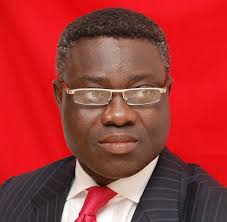President Goodluck Jonathan on Wednesday offered reasons to the National Assembly on why he refused assent to the Constitution Amendment Bill passed by the National Assembly and forwarded to him for approval.
The President, in his letter read to the lawmakers, said his action was based on shortcomings in some sections of the bill.
The President faulted Section 4 of the Fourth Alteration Act, 2015, which seeks to alter Section 9 of the 1999 Constitution by inserting a new subsection 3A, which dispenses with the assent of the President in the process of constitutional amendment.
He said, “However, this alteration can only be valid if the proposal was supported by the votes of not less than four/fifth majority of all the members of each House of the National Assembly and approved by a resolution of the House of Assembly of not less than two/thirds of all the states as provided by Section 9 (3) of the 1999 Constitution.
“This is a fundamental requirement of the Constitution and in the absence of credible evidence that this requirement was met in the Votes of Proceedings of the National Assembly, it will be unconstitutional for me to assent to this bill.
“In light of the above, I am of the respectful view that I should withhold assent until it can be shown that the National Assembly has complied with the threshold specified in Section 9 (3) of the 1999 Constitution.
“However, assuming without conceding that the necessary thresholds were met by the National Assembly, there are a number of provisions in the Act that altogether constitute flagrant violation of the doctrine of separation of powers enshrined in the 1999 Constitution and an unjustified whittling down of the executive powers of the federation vested in the President by virtue of Section 5(1) of the 1999 Constitution.” Mr. President also described the new sections 45A and 45B, which guarantee the right to free basic education and free primary and maternal care services as too open-ended.
According to Jonathan, the right to free education should have been restricted to government schools.
He said further, “This is because a right, unless qualified or restricted, must be observed by all. It follows therefore that the right to free basic education under this provision, if taken to its logical conclusion, will invariably apply to private schools, which could not have been the intendment of the legislature.
“This same argument applies to Section 45B, which guarantees unqualified right to free primary and maternal care services. “The implication of this is that private institutions will be obliged under the Constitution to offer free medical services since it is a right and this is not only impracticable, but also could not have been the intention of the law giver.
“There is therefore the need for these provisions to be redrafted to restrict the enjoyment of these rights and place the obligation to provide the conditions necessary for the enjoyment of the rights on the government.”
Under the amended Section 58, which empowers the Senate to veto a bill should the President withholds assent after 30 days from the day the bill is transmitted to him, Jonathan said the power vested in the President to withhold his assent to bills passed by the National Assembly is part of the checks and balances contained in the Constitution.
According to him, withholding of assent constitutes a check on the exercise of legislative powers in a constitutional democracy, especially as the Executive has the responsibility of enforcing laws passed by the National Assembly.
“However, some of the Acts of the National Assembly emanate from Private Members’ Bills, which in many cases, the Executive may not have had sufficient input. “It is also instructive to note that in some cases, more than one bill is transmitted to the President for assent and the President requires the advice of relevant agencies of government before he can assent to the bill.
“Against this background, the 30 days allowed for assent of the President may not be adequate in some cases for the President to make a decision as to whether or not to assent.” He added that the provision failed to recognise certain variables inherent in the legislative process and the wisdom in requiring two-third majority to override the President’s veto.
“In the light of the above, I am of the view that the failure to signify assent by the President within the prescribed period of 30 days should rather be treated as dissent.”
Other sections of the bill faulted by President Jonathan include Sections 82, which seeks to limit the period when expenditure can be authorised in default of appropriation from the six months provided in the Constitution to three months, and Sections 84A and 84F which deal with the appointment of accountant general.
“The provision of Section 84A that creates the new Office of Accountant-General of the Federation distinct from Accountant-General of the Federal Government has not addressed the funding requirement for the establishment of the office.
“It is necessary to clarify, for instance, who staffs and funds the office of Accountant-General of the Federation and from whose budget he will be paid since he serves the three tiers of government.
“It is also important to state who will exercise oversight powers over the office. Furthermore, the National Economic Council, which is mainly an advisory body, is now charged with the responsibility of recommending those to be appointed to the Office of Accountant-General of the Federation.” On the separation of the Office of Attorney-General of the Federation from the Minister of Justice, Jonathan described the alteration as ambiguous.
He stated: “These alterations encapsulate wide-ranging provisions that seek to separate the Office of Attorney-General of the Federation from the Minister of Justice and the Attorney-General from the Commissioner for Justice in the respective states of the federation.
They also provide for the independence of the Office of Attorney-General by guaranteeing tenure and funding. “However, as desirable as the separation is, there are some provisions that validate the doctrine of separation of powers and also negate the age-long independence and absolute discretion that the office has enjoyed for centuries since its creation in middles ages.
The potential challenging provisions are discussed below: “The first noticeable setback is that the Fourth Alteration Act 2015 is silent on who is the Chief Law Officer of the Federation/State.
This is serious lacuna, which may create implementation challenges. “It will be recalled that the Attorney-General of the Federation (AGF) and Minister of Justice and the Attorney-General and Commissioners for Justice in the respective states of the federation are under sections 150 and 195 of the 1999 Constitution, the Chief Law Officers respectively.
“Apparently, it is based on the fact of being the Chief Law Officer, that the AGF has the power to guide the MDAs on legal issues by way of legal advice and represent the government on other legal matters including civil litigations, contract, treaty obligations, legal drafting, etc.
“This amendment, which limits the power of the AGF to criminal prosecution and is silent on who is the Chief Law Officer, appears to erode the constitutional and legal basis for the current structure and functions of the Ministry of Justice and the Law Officers employed therein, in the absence of a statute that provides for the exercise of these powers and functions.
Consequently, if it is the intendment of the National Assembly to make the Minister of Justice the Chief Law Officer, it should be expressly stated. This will enable these functions to continue to be traditionally performed by the ministry under the supervision of the Minister of Justice while the Office of the AGF, which is to be independent and separated from the ministry concentrate on prosecutions.
“However, it will be odd if the AGF is not in a position to provide independent advice to government on its policies and programmes and generally guide government action in order to ensure due process and rule of law.”
Senator Sadiq Yar’Adua (Katsina Central) had, immediately after Mr. President’s letter was read, raised a Point of Order, demanding that relevant rules of the Senate be suspended to allow the Upper Chamber commence immediate debate on the president’s veto. Yar’Adua said: “I think it is important for us to discuss that letter and see whether there is need for us to consider it or not.
I think he has raised very serious and fundamental issues, especially in terms of our conscience as lawmakers and his own position as the chief executive officer of the Federal Republic of Nigeria.
That is why I am raising this Point of Order.” Ruling on the Point of Order, Senate President, David Mark, urged his colleagues to be patient pending when copies of Mr. President’s letter are circulated to all the lawmakers.














